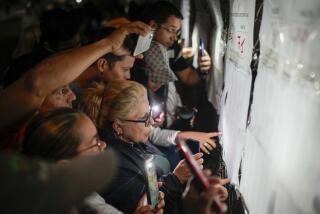Zimbabwe Voting Off to Impressive Start
- Share via
MARONDERA, Zimbabwe — Defying intimidation and threats of violence, voters in this southern African nation went to the polls in large numbers Saturday to elect a new parliament that will ultimately reflect a 20-year status quo or a hunger for change.
Long lines began to form early under cloudy skies at the 4,000 polling stations across the country, in an atmosphere of unexpected calm, given the months of aggression and bloodshed that have preceded the election--the fifth since Zimbabwe gained independence from Britain in 1980. A second round of voting will be held today.
“We were expecting a certain degree of drama,” said Namibian Member of Parliament Kaire Mbuende, one of a delegation of election observers fielded by the 14-nation Southern African Development Community.
“But it’s just quiet,” added Mbuende, speaking at a polling station in the suburbs of Marondera, a farming community about 50 miles southeast of the capital, Harare. “There is no drama. We are experiencing a certain degree of tolerance.”
Leaders of the main opposition party, the Movement for Democratic Change, or MDC, expressed confidence Saturday that their party can win a majority of the 120 legislative seats up for grabs and thus weaken the grip on power that President Robert Mugabe’s Zimbabwe African National Union-Patriotic Front, or ZANU-PF, has maintained for two decades.
“People have shown extraordinary courage,” said MDC standard-bearer Morgan Tsvangirai, 48, relaxing at his home in an upscale Harare suburb after making a round trip of about 375 miles to his birthplace to cast his vote. “I was doubtful that people would come out in the thousands. . . . It is indicative of the determination of Zimbabweans.”
“The general feeling is that the tide has turned from fear to anger in the rural areas, and [people] are now saying, ‘We’ve had enough,’ ” said Michael Auret, another MDC candidate.
A preliminary tally of the turnout is expected Monday, along with initial results.
Foreign diplomats and local analysts agreed that, whatever the election’s outcome, Zimbabwe’s typically static political playing field is about to receive a jolt. The fact that voters braved threats of assault and other retribution to turn out in such force was a clear indication that preelection terror tactics--widely blamed on ZANU-PF supporters--had backfired and that Zimbabweans are determined to have a say in deciding their future, these observers said.
“Zimbabwe’s political landscape will not be the same after the elections,” observer Mbuende said. “It’s not going to be business as usual . . . no matter who wins.”
Independent election monitors said the balloting seemed to be proceeding smoothly, despite isolated incidents. But officials from the MDC, which was formed just nine months ago, complained of some instances of violence and other irregularities. The latter included missing pages from voter rolls, resulting in some voters being turned away, including at least one MDC candidate; the checking of voter ID cards by ZANU-PF militants; and the harassment of opposition officials en route to polling stations.
In one area, voters reportedly were asked to hold up their ballot papers after making their crosses so that a polling officer could check “a number” on the papers. In other regions, young ZANU-PF supporters were said to be plastering the walls of polling stations with campaign posters and literature.
The run-up to the vote was marred by a campaign of brutality linked to the invasion of white-owned commercial farms by pro-ZANU-PF militants. At least 30 people, mostly opposition supporters, were killed, and hundreds of others were beaten, tortured or forced to flee. Many opposition candidates campaigned surreptitiously for fear of retribution, while others left their districts altogether.
However, on Saturday in Marondera, an area that suffered much from preelection violence and farm invasions, the mood was tranquil as voters waited quietly to cast their ballots. Many were surprisingly eager to share their views on their choice of party.
“I’m voting for MDC,” said Dereck Chipfupa, 29, a printer. “I’ve never seen anything good that ZANU-PF had done. If [the ruling party retains] power, with my profession, I have decided to go elsewhere.”
“If it were not for Mugabe, we would not have this country,” said Taterera Mengaehama, 62, a veteran of the war for independence, who cast his ballot for the ZANU-PF. “If you ask who is a united leader, you can say Mugabe.”
Many Zimbabweans admire the 76-year-old head of state, whose mandate officially ends in 2002, because of his role as a liberation fighter. His party has used the issue of redistribution of prime agricultural land to the black masses as a platform for securing support.
But Tsvangirai has accused the ruling party of squandering the country’s resources. The MDC has promised to investigate corruption, prosecute the perpetrators of political violence and boost economic growth--a key concern of most Zimbabweans.
The country is reeling under hyper-inflation, a critical shortage of fuel and foreign hard currency, massive unemployment and the suspension of foreign aid. Helping the government of neighboring Congo fight a costly war also has depleted Zimbabwe’s economy, once one of Africa’s most promising.
“The finances of Zimbabweans are very poor,” said Temdai Shoniwa, 33, a builder, as he lined up to vote at a school in Marondera. “We have been living this way for some time. Our hopes have not been fulfilled. We are ready for change.”
Poverty and despair among most Zimbabweans are what will eventually push the ruling party out of power, local analysts say.
“The majority of citizens don’t feel that the government is committed to anything,” said Masipula Sithole, a political science professor and director of the Harare-based Public Opinion Institute. “[After] 20 years in office, Mugabe and his geriatric henchmen have lost vision; have run out of ideas.”
More to Read
Sign up for Essential California
The most important California stories and recommendations in your inbox every morning.
You may occasionally receive promotional content from the Los Angeles Times.














